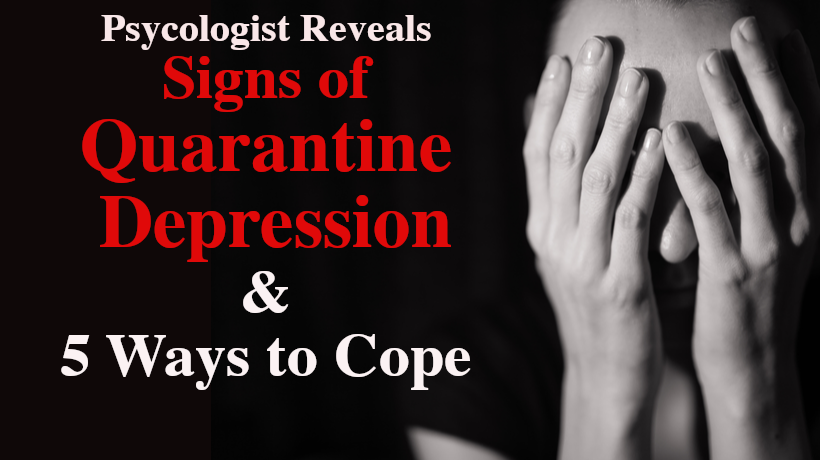Most of us have been in quarantine for a few weeks to try and lower the rate of COVID-19 cases. While staying at home might protect us from contracting the virus, it puts many at risk for psychological distress such as depression. Psychologist Deborah Serani, Psy.D., says it’s important to remain vigilant to vulnerable children, adults, and ourselves who exhibit depressive symptoms. Here are some signs of depression and ways to cope with it during the quarantine.
Signs of depression to be aware of:
- Aches and pains
- Amplified risk perception
- Anger
- Boredom
- Cardiovascular stress
- Changes in eating habits
- Compromised immune functioning
- Confusion
- Contagiousness anxiety
- Counterphobic reactions
- Depressive symptoms
- Difficulty concentrating
- Emotional exhaustion
- Fear and apprehension
- Financial worries
- Frustration
- Helplessness
- Hoarding
- Hopelessness
- Impaired executive functioning
- Insomnia or hypersomnia
- Irritability
- Numbness
- Overuse of drugs, alcohol
- Physical exhaustion
- Post-traumatic stress symptoms
- Sadness and despair
- Somatic experiences
- Stigma concerns
Here are five steps recommended by Dr. Serani to cope with these symptoms:
- Plan ahead: Serani says, “Having a plan to gather supplies and necessities will help maintain predictability during a most unpredictable time. Aim for at least a two-week’s supply for food, water, and other essentials.” If you are wary of going out to stores, try and use online delivery services. Ask for help if you are struggling to get essential items. Having what you need may help steer you away from feeling trapped and worried.
- Limit your media exposure: It is important to know what is going on, but an overexposure in media content reiterating the same fear-based news can cause your mind to race. Serani explains, “News stories can deepen feelings of hopelessness and despair when you live with depression. Studies suggest that a quick update in the morning each day (about 15 minutes) will give you enough daily information.”
- Mix up your day-to-day: You may have heard that having structure in your schedule is important. While this is true, staying at home can feel restrictive and cause you to experience boredom. Serani suggests, “To help minimize these feelings, consider shifting the textures of your environment every few days. Listen to music for a few days. Then light a scented candle for a few days thereafter. Shift and read a book for a few days. Sit outside for lunch if the weather permits for a few days. Move from there and do some cleaning and reorganizing. Indulge in self-care treatments, like a long bath or a hot shower, meditate or try some yoga. Go for a walk in the rain. Changing the focus of your days will stimulate your mind, body, and soul and help ease mood swings”.
- Watch your words: It is hard to not fall into a pessimistic way of thinking during these times. What you say to yourself is more important than you may think. You might find yourself saying things like, “I’m trapped.” “This will never get better.” “Nothing will ever be the same.” Serani says that being resilient during trauma requires a cognitive shift. Choosing positive words and phrases to replace negative ones is crucial in shifting one’s mental well-being.
- Keep up with your treatment plan: For those who are diagnosed with depression, ordinary days can be challenging. It is vital that during traumatic and stressful times you follow the plan your doctor discussed with you. Serani says, “Things like taking medication daily, tending to self-care, sleeping and eating well, exercising, using holistic approaches to ease depressive symptoms and keeping your scheduled telemedicine therapy sessions.”
Sources:



